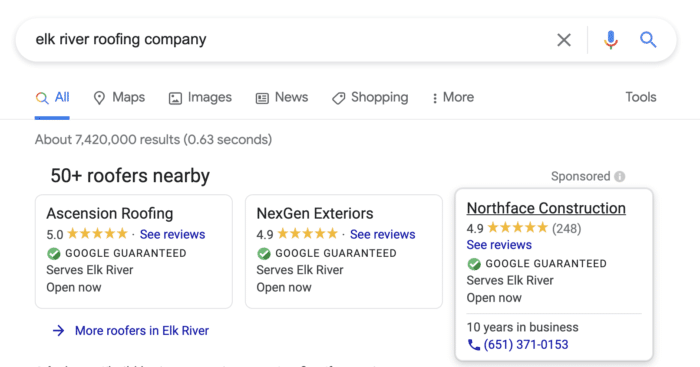Google local service ads are phenomenal for getting leads when you’re high on the list.
Hundreds of home services companies flocked to the service in every major city because of how effective it was…
And then *BOOM* – it became somewhat oversaturated, and it became harder to win that first position.
You have three options:
- You can decide that the opportunity isn’t worth it anymore.
- You can assume there’s nothing you can do, and let the cards fall where they may.
- You can tweak the top 8 things to improve your ranking and win more often! This list is for those of you that want actionable, next steps to climb the ranks.
Here we go!

Here are the criteria Google uses to determine which listing to show first in Google Local Service Ads:
- Proximity
- Reviews
- Responsiveness
- Business Hours
- Complaints
Here are the 8 quick ways to improve your rankings on Google Local Service Ads:
1. Optimize Your Service Types
Make sure your service types are optimized- Look at your Service areas and make sure they are optimized.
2. Highlight key elements of your business
- Standard Highlights: These are highlights that are true for your business. Examples of standard highlights are: 24/7 service, 10 years in business, locally-owned and operated, military discount available, free estimate, flat rate pricing, etc.
- Google-controlled Highlights: These are highlights that are controlled by Google. Examples of these highlights are: BBB Accreditations, On-Time Guarantee, etc.
3. Be as Responsive as You Possibly Can Be to Inquiries
Respond to inquiries in 5 Minutes.
Definitely ‘response time’ is the biggest thing it appears.
Come up with systems for ensuring people on your team are doing this, and doing it at a high-level of customer service. Google does address complaints if your company is consistently dropping the ball.
4. Ensure your service area is in proximity to the highest density of ideal customers
This might mean having small offices in different cities nearby where high-density populations of higher-end homeowners might be, or it might mean expanding the service area of existing offices.
Google Local Services allows you to set this, to a degree, when’s the last time you tweaked this based on where your team can travel to, profitably?

5. Get as many reviews as you possibly can.
But you already know that.
I might suggest Podium or PulseM as services to automate follow up about Google reviews if you don’t have a system in place for reputation management.
Hint: Don’t spend too much money on this – no amount of software will extract positive leads if your team doesn’t deliver a great service.
6. Crank up that budget
We’ve seen some people have success with setting the budget to ridiculously high levels, even if Google wasn’t every going to spend that money.
For instance – Google is only spending $500 a week, but you’ve set it to $5000 – it may not seem like it relates, but could have an effect, I’ve seen stranger things being effective. Experiment.
It may have to do with Google’s algorithm identifying partners that are more likely to spend more – if they serve their listing more often.
This one is unconfirmed, but I have heard it from multiple companies that have seen results from this strategy.
7.Building out everything you can on the profile (locations, services, about, etc.)
It’s always about COMPREHENSIVENESS.
The more Google can identify that you’re profile is 100% filled out, the more likely they will be to serve that listing.
Is every last item filled out as much as it possibly can be on your profile?

8. Something that The Big Google doesn’t explicitly say, but I SUSPECT could play a minor role is GMB activity (posting updates and stuff), but that’s not confirmed.
Maybe this is more of a conspiracy theory – but GMB activity like the above posting, is not hard to do at least once a week or once a month.
It’s great for when people Google your company name, and if it *may* have some effect on Google maps, then even better.
Ultimately – go hard on the basics, be consistent and think long-term
I have to imagine if Google has one business that pulls in and out of Google Local Services / Google Guaranteed, and one that is consistent and takes leads every week – it’s going to honor the more consistent company.
Think from Google’s perspective, and try to be consistent about your strategy, rather than pulling out wildly when you get too busy.
Yes – it’s not people making these decisions individually, but you can imagine the motivations of the corporation of Google, and try to play into that, and do what they incentivize.















